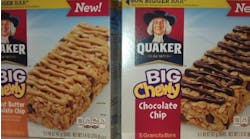Campbell Soup Co. today (March 28) said it's transitioning to cans that do not use bisphenol A (BPA) linings, a process that should be complete by the middle of 2017. The company has begun using cans with linings made from acrylic or polyester materials for its U.S. and Canadian products.
It's another consumer-facing announcement from the firm, which in January became the first big food company to commit to labeling products for the presence of genetically engineered ingredients.
Campbell first announced its intention to move away from BPA linings in February 2012, in response to consumer feedback. Since then, the company says it has tested hundreds of alternatives, but there were technical challenges. They included identifying linings that would ensure the safety of more than 600 different recipes, such as its tomato-based products, which are naturally acidic and can react with some linings over time.
“Our priority throughout this transition has been, and will continue to be, food safety,” said Mike Mulshine, senior program manager-packaging. “We have tested and conducted trials with hundreds of alternatives to BPA lining and believe the acrylic and polyester options will ensure our food remains safe, affordable and tastes great.”
The products that will be packaged in non-BPA lined cans include all varieties of Campbell’s soups and gravies, Swanson broth and SpaghettiOs pasta. The company says it expects to have 75 percent of its soup portfolio in non-BPA lined cans by the end of this year.
Campbell also is testing alternatives to BPA coatings used on other packaging, including aluminum cans used for some V8 beverages and metal screw-top lids on glass jars. The company is on track to transition these products to a non-BPA solution by the middle of 2017. Campbell also offers products in packaging that already does not use BPA, including cartons, pouches and PET bottles.
The company noted BPA has been widely used in metal food packaging for more than 40 years and is one of the safest packaging options in the world. This is confirmed by extensive scientific studies and regulations of the U.S. FDA and many international regulatory agencies.

